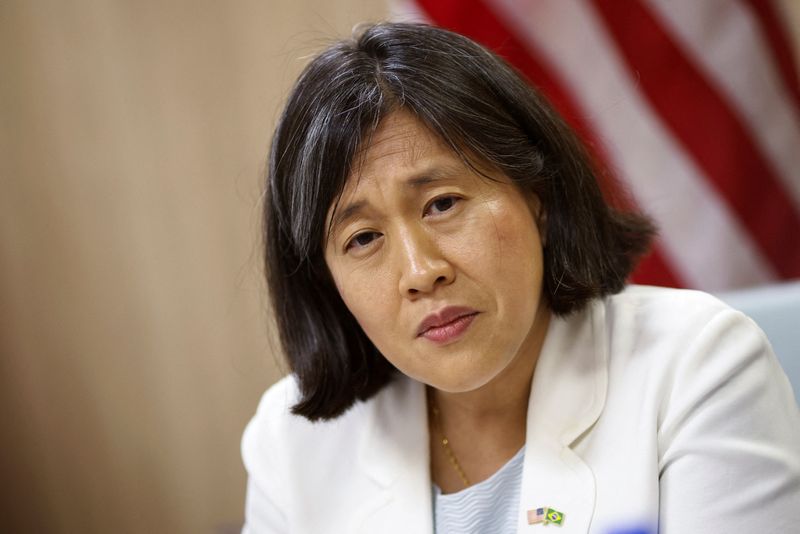By David Lawder
WASHINGTON (Reuters) -The United States and Japan on Tuesday signed a trade deal on electric vehicle battery minerals that is key to strengthening their battery supply chains and granting Japanese automakers wider access to a new $7,500 U.S. EV tax credit.
The swiftly negotiated agreement prohibits the two countries from enacting bilateral export restrictions on the minerals most critical for EV batteries, according to senior Biden administration officials. The minerals include lithium, nickel, cobalt, graphite and manganese.
The deal also aims to reduce U.S.-Japanese dependence on China for such materials by requiring collaboration to combat "non-market policies and practices" of other countries in the sector and on conducting investment reviews of foreign investments in their critical minerals supply chains.
Minerals-focused trade deals are one way that the Biden administration hopes to open up access for trusted allies to the $7,500 per vehicle EV tax credits in last year's climate-focused Inflation Reduction Act.
The Biden administration is now negotiating a similar agreement with the EU.
Half of the credit for purchasing consumers is reserved for North American-assembled vehicles and batteries, a source of considerable tension with the EU, Japan and South Korea, which worry that the U.S. incentives will draw EV and battery investments away from their shores.
The other half of the credit is contingent on at least 40% of the value of critical minerals in the battery having been extracted or processed in the United States or a country with a U.S. free trade agreement or recycled in North America.
Japan's trade minister, Yasutoshi Nishimura, told reporters in Tokyo that EVs made with battery minerals mined or processed in Japan were expected to meet the requirements to qualify for that part of the U.S. tax credits.
Earlier, American officials had said that determination was up to the U.S. Treasury, which expected to define sourcing requirements for the EV tax subsidies by the end of this week in guidance anxiously awaited by automakers, miners and battery producers.
"As the demand for electric vehicle batteries is expected to grow significantly, securing important minerals essential for their production is an urgent issue," Nishimura said.
REBUKE FROM DEMOCRATS
U.S. Trade Representative Katherine Tai, signed the limited, 10-page sectoral agreement on Tuesday in Washington with Japan's ambassador to the United States, Tomita Koji.
"Japan is one of our most valued trading partners and this agreement will enable us to deepen our existing bilateral relationship," Tai said in a statement.
But Tai did not seek congressional approval for the pact, drawing a strong rebuke from the top two Democrats on trade matters in Congress, Senate Finance Committee Chairman Ron Wyden and House of Representatives Ways and Means Committee Ranking Member Richard Neal, who called it "unacceptable."
"Without enforceable environmental or labor protections, the Administration abandons worker-centric trade policy and jeopardizes our climate work by opening the door for another environmental catastrophe," Wyden and Neal said in a statement of rare trade criticism from President Joe Biden's own party.
Wyden and fellow Democratic Senator Joe Manchin have voiced strong opposition to the Biden administration's efforts to apply the tax credits to vehicles produced outside North America, as they intended for it to jump-start investment in U.S. battery and EV production.

The Biden administration officials argued that meeting climate goals will require a massive cooperative effort among trusted U.S. allies to produce the vast amounts of minerals needed to electrify the global auto market and the deal includes commitments on environmental standards and worker rights.
The two countries agreed to review the minerals agreement every two years, including whether it is appropriate to terminate or amend it.